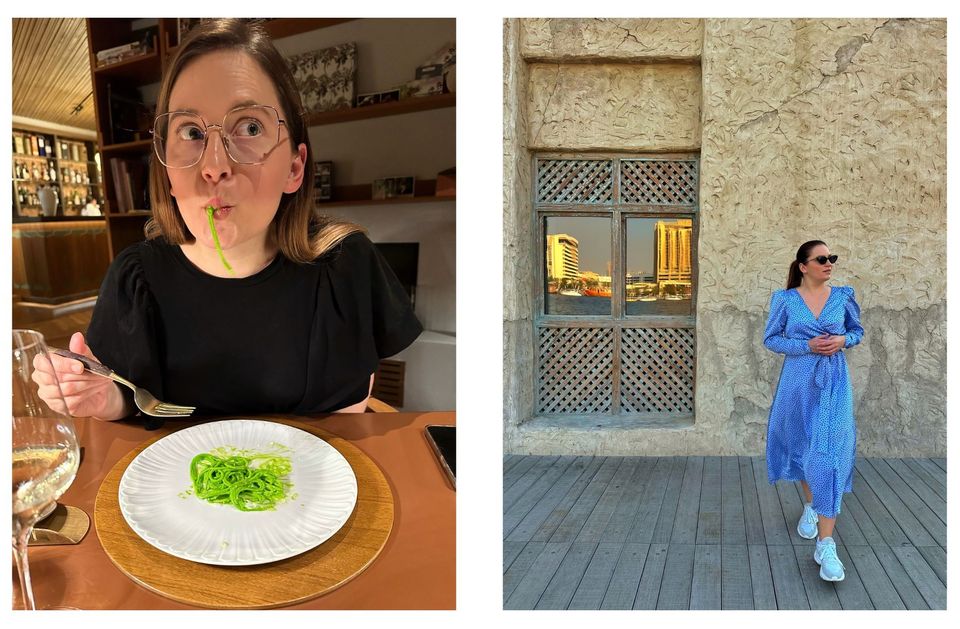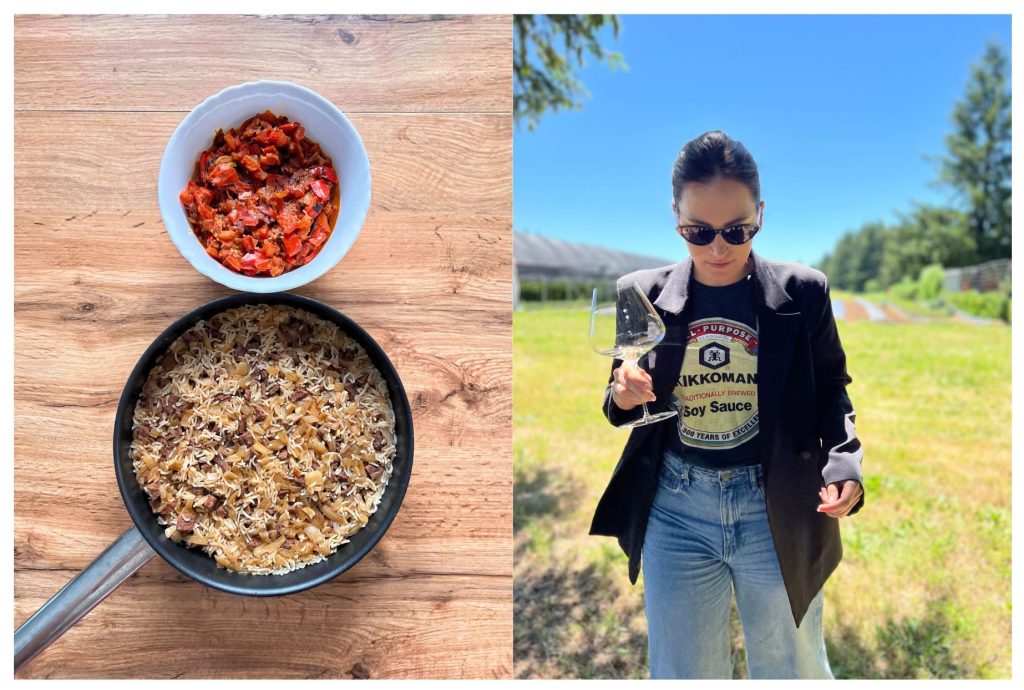News
12. 7. 2024
Interview with Nastasja Petrić: Culinary Arts, Travel, and Family Meals

Nastasja Chiara Petrić, a renowned culinary enthusiast and author, has captured the hearts of many food lovers with her work. Known as a chef, gastro blogger, and creative mind, she gained wider recognition about ten years ago as a contestant on the first Croatian MasterChef. She began her culinary career as a sous chef at the restaurant diVino in Hvar and later gained experience at Zagreb’s restaurants Prasac and Bistro Apetit.
Today, her Instagram profile is followed by over 30,000 people, where she shares her knowledge, tips, recipes, and experiences daily. Nastasja is also the author of the cookbook “Kuhaj drugačije (Cook differently)” which offers innovative recipes and inspiration for all cooking enthusiasts who want to explore new flavors and techniques in the kitchen.
In this interview, Nastasja shares her culinary passions, travel experiences, and how she balances delicious and healthy meals for her family.
What motivated you to enter the world of culinary arts?
“I’ve always loved good food. One of my earliest childhood memories is hearing people comment on how they enjoyed watching me eat, and I was always around my grandmother in the kitchen, especially when she was preparing Christmas cookies. I believe these early experiences deepened my love for cooking.”
What does it mean to be a chef today?
“Cooking can be learned, but creating delicious dishes is still linked to talent and palate. Some people need precise measurements of salt for a recipe to succeed, unlike those who have it ‘in their fingers.’ That feeling while cooking and enjoying it makes a difference in how the dish turns out. Given that a professional chef’s life is extremely demanding and tough, one needs at least that love for cooking to make the chef’s job a bit easier.”
You travel a lot and explore cuisines worldwide. Which cuisine do you like the most, and what habits from various cultures would you recommend adopting?
“Anyone who follows my career and daily life knows that my favorite cuisine is Asian. I might prefer Japanese a bit more than others, but I still love Thai and Chinese as well. I regularly prepare such dishes at home, at least twice a week, and I always keep everything necessary in the fridge and pantry to achieve the most authentic taste possible from what I’ve experienced on my travels. In Japan, the focus is on the ingredient, which is not overly treated, neither thermally nor with spices, and I love that they have cherished valuable fermentations like miso paste and soy sauce, which are pure umami and elevate every dish. Respect for quality ingredients is crucial for every chef or person who loves to cook (and eat).”
Which cuisine is your favorite? What makes it special?
“Although I prefer Asian flavors and cooking styles, our Mediterranean cuisine is also very dear to me. Each season brings a plethora of excellent ingredients we look forward to, so it is priceless to welcome asparagus and young peas in spring, tomatoes and watermelons in summer, apples and pumpkins in autumn, and we eat salads and kale in winter. I think one of the greatest riches is having the opportunity to taste the true original flavors of seasonal fruits and vegetables, which we still fortunately have in this part of the world.”

DEFINING HEALTHY MEALS
In your opinion, what makes a healthy meal for the family? Can you give an example of organizing a day’s meals to ensure your family eats healthily?
“A shared meal is the healthiest meal. When we eat together, or even better, when we prepare meals together, we create the best habits. Even if it’s pizza, burgers, and fries, the entire process of preparing the meal from scratch, involving the family members in the process, makes the meal healthy. Not every day is like that, and that’s okay, but assigning one person to set the table, another to toss the salad, and a third to wash the dishes… these are habits we should adopt and teach our children to follow. And believe me, they really enjoy being involved; for younger children, it turns into an additional activity. And I wouldn’t compare ‘healthy meals’ on a daily basis but rather on a weekly basis. During the week, we eat cooked, simple, and quick meals, and on weekends, we relax and enjoy what we love the most.”
Top 5 foods that nutritionally satisfy a family’s needs and can be found daily at the market or store?
“Eggs, quality bread, seasonal fruits and vegetables, a whole chicken, olive oil.”
What, in your opinion, constitutes an unhealthy meal? How do you navigate or minimize these choices in your family’s diet?
“I personally don’t like using terms like healthy and unhealthy food, but the fact is there are foods we should eat minimally or for occasional indulgences. Some people are absolutely against canned food, but on the other hand, sardines or cooked legumes come in such packaging, and we all have them at home and eat them on a weekly basis. There is a lot of ultra-processed food on the market whose composition we can’t even pronounce, let alone know what it is, so in that case, I would try to completely reduce or eliminate ready-made foods that are just reheated (pizzas, lasagnas, canned stews, etc.). On the other hand, you’ll always find frozen vegetables in my freezer, which is ideal for quick meal preparation, like peas and broccoli, because once you become responsible for regularly preparing meals for the whole family, you want to make it as easy as possible.”
What are the impacts of such a diet on children and adults? Can you link it to emotions, hormones, concentration…?
“The world has become really fast, with thousands of constantly changing information, and people are understandably confused. But if we take care to pay attention to our diet, purchase quality food, get enough sleep, exercise daily, rest, nurture our minds, and enjoy things that make us happy surrounded by people we love, I think everything else is much easier to maintain. I love cooking for my family, but I also love going out with them for cake and pizza. It’s not a philosophy, just a normal, healthy family life.”
When choosing vegetables at the store, what do you look for to ensure freshness and nutritional value? How do you work on getting children to accept a variety of vegetables?
“To have my children eat (and love to eat) a variety of fruits and vegetables today, I worked on that from the first day of their introduction to solid foods. They were surrounded by such food, I didn’t force anything on them, and I believed that by exposing them to such food and a relaxed approach, they would eventually come to love eating everything we as a family eat. Of course, each of us has our own taste preferences, so each of us over time shows a preference for something more or less. That’s absolutely normal and natural. In the store, I buy seasonal vegetables, although in large supermarkets that doesn’t mean much anymore because it feels like everything is available all year round, so I prefer markets, small producers, and my own eyes and nose when shopping, trying to judge what’s okay.”
Difference in quality between market-bought, home-grown, and today’s supermarket foods?
“Big. Regardless of the labels. The only way to be completely sure it’s okay is if you have your own garden that you care for daily and see how it grows. Today, I believe the greatest wealth is having food from a trusted source and cultivation.”
USING OLIVE OIL
Olive oil is known for its health benefits. Can you share how you incorporate olive oil into your family’s meals? Are there specific dishes where it is indispensable for you?
“We use olive oil literally every day. When I fry eggs in the morning, when I dress a salad, when I don’t feel like eating anything but a bit of bread and oil on a plate. I highly value olive oil, its taste, range, and effects. And I always prefer oil that I know is of excellent quality. I mostly eat it raw, but occasionally cook with it. I feel bad about processing it thermally because I love to feel its full flavor when it’s just poured over vegetables or on bruschettas.”
What is important to know about olive oil from your perspective?
“Olive oil is one of my favorite **spices** in cooking. There’s no dish that can’t be elevated with top-quality extra virgin olive oil.”
In conclusion, olive oil plays a crucial role in Nastasja Chiara Petrić’s kitchen, not only for its health benefits but also for its ability to enhance the flavor of every dish. Its presence in everyday meals, whether used raw or for cooking, makes it an indispensable part of her culinary philosophy. Nastasja believes that top-quality extra virgin olive oil can elevate every dish, making it the perfect spice in cooking.